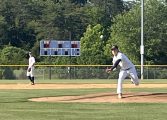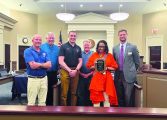By Ruthann Carr, correspondent
Just days before teachers are scheduled to report to the classroom they found out students won’t be in the same room with them when school starts Sept. 8.
On Wednesday (Aug. 13), the School Board voted 3-2 to open with a full virtual schedule for the first nine weeks.
School Board meetings are broadcast live on Facebook and Google. Hundreds of community members, parents and teachers watched for more than four hours as the Board discussed the issue and voted just before 11 p.m.
Social media reaction to the vote was immediate and as split as the Board’s vote.
Those wanting the hybrid start expressed concerns about students falling behind, parents having to arrange child care or quit jobs to stay home and special education students’ needs not being met in an online setting.
Other praised the Board’s decision citing concerns for public health.
Voting for the full virtual/remote start: Chair Perrie Johnson (Fork Union), Co-Chair Shirley Stewart (Rivanna) and James Kelley (Palmyra); against: Charles Rittenhouse (Cunningham) and Andrew Pullen (Columbia).
Superintendent Chuck Winkler urged the Board to vote for the hybrid model he proposed and his administration had worked on for weeks.
The only change to that model was every child would have to wear a mask, even in places maintaining a six-foot distance.
That addition was due to a rise in COVID-19 cases among students in states where schools have already started in-person teaching.
As of the meeting, 40 percent of Fluvanna families chose to have their students attend fully virtual.
Winkler said he expected that number to go up with the announcement of required face masks.
During the discussion, Kelley pointed out that all surrounding counties but Louisa voted to start school fully virtual.
“What makes us exceptional?” he said. “Why us? Why are they (Fluvanna students) immune to this (virus)?”
Winkler said he thought the best educational plan was for students to be in the classroom at least for the two days/week called for in the hybrid plan.
“We’re educators. We’re Flucos,” Winkler said.
He acknowledged the possibility that an outbreak of COVID-19 cases could close down the schools again, but said he felt the few weeks in the classroom was beneficial.
Pullen said those who wanted to attend virtually already had that choice.
“What gives us the right as a School Board to dictate to others, the parents of children who want to go back to school, we’re telling them we’re going to restrict your choice and make you go all virtual…? I don’t think that’s what we as a School Board should do…,” Pullen said. “I’m also concerned about the unintended consequences of going virtual.”
After the vote, Winkler posted on Facebook: “The Fluvanna County School Board took on a courageous undertaking tonight as they voted on our reopening plan. As Flucos, we will be opening our school system with a virtual/remote learning approach on September 8th. Please know that I remain steadfast to my commitment to you and this community. WE will begin planning for this model tomorrow and collectively, WE will make it happen together…”
During the meeting, Winkler reported the school planned to purchase 250 Wi-Fi connections that will be available at various churches, community centers and other spots in the county to provide Internet access for students who don’t have it at home.
Of the approximately $1.2 million carryover from the 2020 school year budget, Winkler plans to ask the county for about $700,000 back to use for mitigation, virtual learning costs and transportation.
Before the vote, Johnson asked the Board to commit to paying full-time staff whose jobs may not be needed in a virtual setting.
Without a formal vote, all agreed to do that for at least the first nine weeks of school.
Winkler suggested many of those staff (bus drivers, cafeteria workers, maintenance) could be retrained and used in other ways.
Before the vote, Pullen said he understood people’s reservations about a possible rise in COVID-19 cases.
“I don’t think it’s our concern. Their health care isn’t our concern. Our concern is to provide them with choice,” he said. “It’s not our role to decide for families what’s best for them…we need to make sure we’re not making decisions based on emotion rather than reason.”
Stewart said she thought the Board’s responsibility is to offer education to children.
“And we would still be upholding that responsibility with virtual learning,” she said.
Kelley said Pullen’s question about the Board’s role was compelling.
“At what point did we get to decide whether individuals get to make their own decisions or whether we’re going to make policy? Policy is the role of this Board and making these decisions is about preserving public health…” he said.
After the vote, Rittenhouse said he thought all the talk about COVID-19 would go away after the election.
“I can’t help but think that a lot of COVID numbers are distorted and after the first week in November I imagine all this will fizzle like a dud firecracker and the media won’t be distorting it like it’s been doing on a daily basis…” he said.
Kelley said the vote was not an easy one.
“…I hope that the cost we’re passing on the community is less than the cost that we would bear if we put the students in. At this point based on the available information I believe that to be the case. I don’t take any of it lightly I won’t sleep any easier anytime soon based on this decision or on the way this (virus) is going, but I hope individuals know there’s real deliberation and analysis going on here and this isn’t being done in a vacuum.”
The Board also voted 3-2 to approve an AP environment science text book over Pullen’s objections that it contained “more politics than science.” Rittenhouse joined Pullen voting against the textbook.




